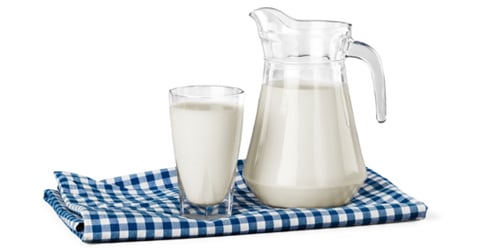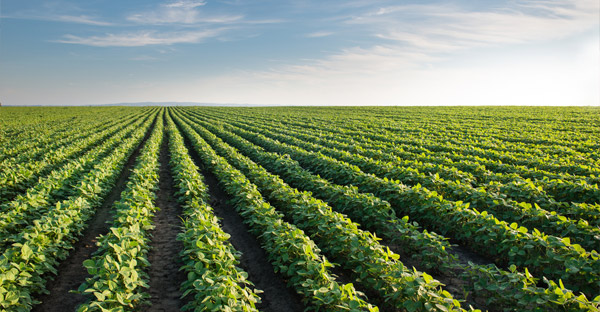
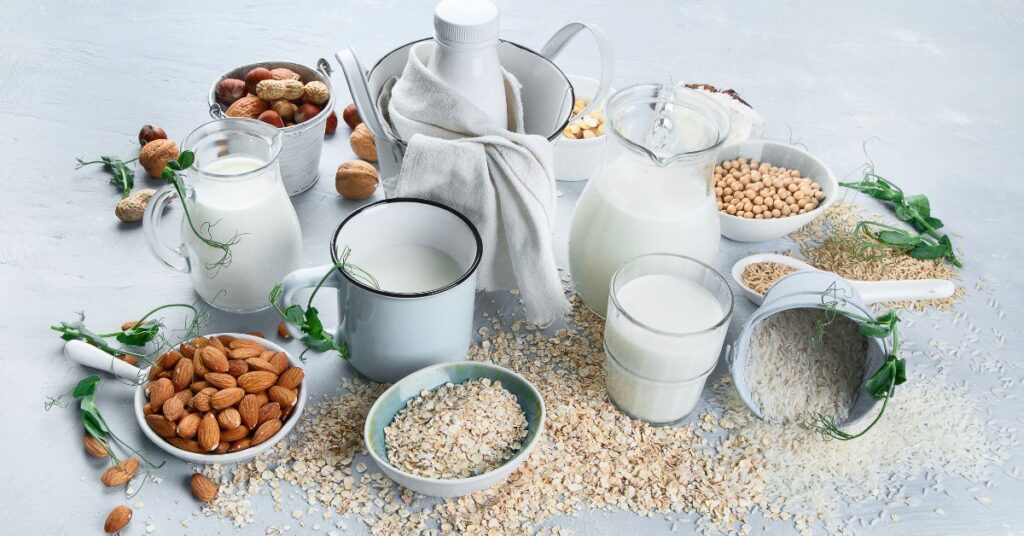
Sustainability is finally becoming a major talking point for individuals, businesses, and governments around the world. People pay more attention than ever before to the amounts of fossil fuels being used, especially in our food system.
Plant-based diets get a lot of good press when it comes to sustainability. The diet supposedly requires less land, produces less greenhouse gas emissions, and requires a lower cumulative energy demand.[2] So it’s no surprise that these diets are becoming more popular. The number of people adopting the vegan diet has dramatically increased over the past years. An astonishing 3.9 million people in the UK reported following a vegan diet in 2020.[1]
But is the vegan diet as sustainable as we think?
The short answer seems to be yes, and a quick comparison of dairy milk versus plant-based alternatives shows you some of the reasons why. The production of dairy milk releases large amounts of methane, ammonia, and other substrates and gases; these excesses all contribute to global warming.[3] Milk production has a global warming potential (GWP ) of 48–65%[3]; for every 1kg of dairy milk produced, just over 1kg of CO2 is released into the atmosphere.[4] Soy milk, on the other hand, releases just over 0.4kg of CO2.[4]
The production of dairy milk requires vast amounts of land and water. It is picturesque to see the cows grazing the fields on a summer evening, but behind the scenes, vast areas of natural, diverse land are being destroyed and turned into monocultures in order to mass-produce feed for cattle.
There are also concerns about land and resource use. The production of dairy milk requires vast amounts of land and water. It is picturesque to see the cows grazing the fields on a summer evening, but behind the scenes, vast areas of natural, diverse land are being destroyed and turned into monocultures in order to mass-produce feed for cattle.
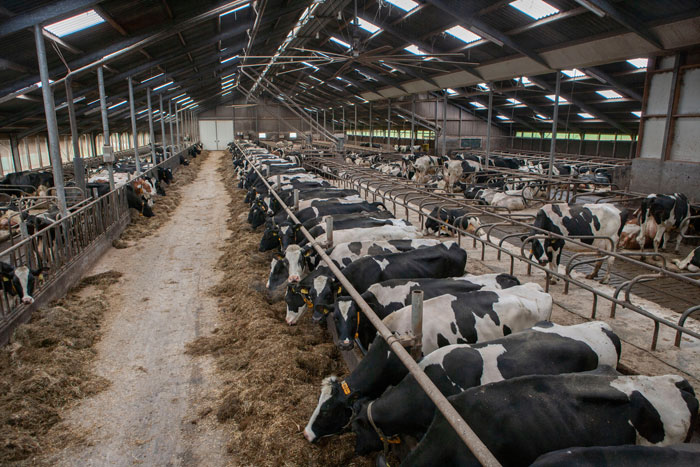
But before we praise vegan milks too much, we should take a closer look at their production. Almond and soy milk are the two most popular vegan milk choices on the market today, so these are the ones we’ll be looking at. A collective $1.43 billion or more is spent annually on these alternatives.[5] Soy milk sales have decreased by 8.9%[5]—potentially because of confusing media stories about the health effects of soy products—while almond milk sales have increased by 10.3%.
There are also concerns about soy and the deforestation of the Amazon rainforest: Brazil is responsible for 31% of soybean production, and approximately 1 million hectares of the rainforest have been demolished for soybean production.[6] However, the vast majority of soy produced worldwide is being used to for animal feed, not human consumption, and of the soy being consumed by humans, only a fraction of that is being consumed as soy milk. So despite the fact that soy production is threatening natural habitats and putting many species at risk of extinction, it would be disingenuous to blame soy milk.
Additionally, soy production releases significantly less greenhouse gas[4] and requires less freshwater[7] than the production of dairy milk. Clearly soy milk is a more sustainable choice than dairy.
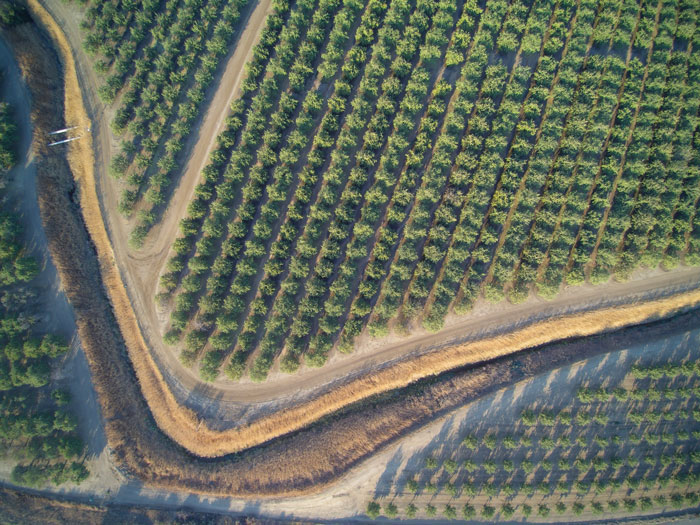
Almond milk sits at the opposite end of the sustainability impact scale when compared to soy milk production.[8] Almonds require a LOT of water to produce—1.1 gallons for just one almond![9] This has a heavy impact on the natural landscape, especially as the majority of almonds are produced in California, an area already prone to drought. Being produced in California also increases the carbon footprint of almonds: they have to travel long distances to reach consumers around the world. Despite these factors, almond milk production still has a lower global warming potential and freshwater usage than the production of traditional dairy milk[10].
It is clear that plant-based alternatives are more sustainable than regular dairy milk, but there are different degrees of sustainability among these alternatives. Here we’ve only covered the most popular choices, but be sure to check out oat milk, pea milk, hemp milk, and a whole lot of other wonderful blends! When you’ve chosen your favourite, try to make sure that it is sourced sustainably and avoid brands that rely on deforested land for production or transport their products all the way across the globe. You can even make your own!
References
- Our Sporting Life. Veganism Statistics UK (2020) [Internet]. 2020 [cited 20 Feb 2022]. Available from: https://oursportinglife.co.uk/veganism-statistics-uk/.
- Lacour, C. et al. Environmental Impacts of Plant-based diets: How Does organic Food Consumption Contribute to Environmental Sustainability? Front. Nutr. 2018 Feb 9; 5(8): 1-13. Available from: https://doi.org/10.3389/fnut.2018.00008.
- Boer, I. Environmental impact assessment of conventional and organic milk production. Livestock production science. 2003 Mar; 80(1-2): 69-77. Available from: https://doi.org/10.1016/S0301-6226(02)00322-6.
- Coluccia, B. et al. Assessing the carbon footprint across the supply chain: cow milk vs soy drink. Science of the Total Environment. 2022 Feb 1; 806(3): 151200. Available from: https://doi.org/10.1016/j.scitotenv.2021.151200.
- Statistica. Almond Milk Is The Biggest Alternative To Dairy [Internet]. 2019 [cited 20 Feb 2022]. Available from: https://www.statista.com/chart/17981/sales-of-alternative-to-dairy-products/.
- Macedo, M. et al. Decoupling of deforestation and soy production in the southern Amazon during the late 2000’s. PNAS. 2012 Jan 24; 109(4): 1341-1346. Available from: https://doi.org/10.1073/pnas.1111374109.
- Ertug. A. et al. The water footprint of soy milk and soy burger and equivalent animal products. Ecological Indicators. 2011 Dec 11; 18: 392-402. Available from: https://waterfootprint.org/media/downloads/Ercin-et-al-2012-WaterFootprintSoy.pdf.
- Statistica. Which (Plant) Milk Is the Most Sustainable? [Internet]. 2020 [cited 20 Feb 2022]. Available from: https://www.statista.com/chart/22659/cows-milk-plant-milk-sustainability/.
- PAESTA. How much water does it really take to grow almonds? [Internet]. 2017 [cited 20 Feb 2022]. Available from: https://www.paesta.psu.edu/podcast/how-much-water-does-it-really-take-grow-almonds-paesta-podcast-series-episode-43.
- Winas, K. et al. Life cycle assessment of California unsweetened almond milk. The International Journal of Life Cycle Assessment. 2019 Dec 10; 25: 577-587. Available from: https://doi.org/10.1007/s11367-019-01716-5.
Copyright 2025 Center for Nutrition Studies. All rights reserved.
Deepen Your Knowledge With Our
Plant-Based Nutrition
Certificate
Plant-Based Nutrition Certificate
- 23,000+ students
- 100% online, learn at your own pace
- No prerequisites
- Continuing education credits


